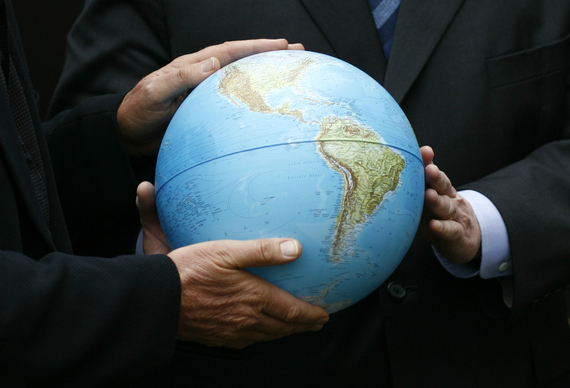If I told you that lawyers were on the frontlines of the fight against HIV in Africa, would you believe me? And what if I told you that legal professionals around the world are achieving lasting social impact working from their desks?
They're clearly not donning stethoscopes. They are not building schools. They are simply sticking to what they do best: provide legal assistance. The difference is that they are doing it for free, reaching out globally through a powerful network called TrustLaw.
The potential benefits of pro bono legal assistance for Africa are huge. Take the Southern African AIDS Trust (SAT). The NGO operates in more than six southern African counties and they want to promote increased acceptability of and access to HIV self-testing in Southern Africa. That is a challenge because they could face massive legal hurdles: is it even legal to sell or distribute such kits, where laws don't cover this new technology? What are the implications around rights to privacy, health, and consent? And what happens if the tests are faulty? These are of course critical issues for the Southern African AIDS Trust to figure out, but they are getting key legal support entirely for free.
Ten top law firms from around the world, including six from sub-Saharan Africa, have come together to research these questions as part of their pro bono work, so SAT is receiving the highest quality legal assistance without having to divert a single rand of their funding from achieving their mission.
This is precisely the reason why, four years ago, I decided to help spread the practice of pro bono all around the world and created TrustLaw, the global service connecting lawyers willing to offer free legal assistance with non-profits and social enterprises. TrustLaw now operates in 150 countries. With its 1,800 members, 400 of which are top law firms, TrustLaw has become the flagship program of the Thomson Reuters Foundation, the organization that I run. Since 2010, we've made over 1,000 connections between law firms and high impact NGOs and social entrepreneurs. We work in countries as diverse as Afghanistan, Fiji, Paraguay, Uganda, Brazil and Saudi Arabia. Through Trust Law, lawyers have given the equivalent of $35 million in free legal assistance.
This incredible amount means that organizations, like the Southern African AIDS trust and many others around the world, can use their precious funds to support their mission - not on legal fees.
So, here's the good news: pro bono is growing. From tiny communities in Nepal to the megacities of Mexico and Brazil, its reach is unstoppable.
Last week, the Thomson Reuters Foundation launched the first annual TrustLaw Index of Pro Bono, designed to identify and assess global trends in pro bono around the world. While we know, because of the work we do every day, that the trend of providing free legal assistance is growing outside of traditional markets like the US, England, and Australia, we haven't had to date any concrete data that helps us track how things are improving, and the huge amount being done. With the TrustLaw Index, that will change.
The data we have gathered is striking. It tells a story of growing enthusiasm - and challenges - for firms around the world as they try to do more for free for charitable and social impact organizations. Over 100 firms working across 69 countries responded to our call for data. They range in size from one or two lawyers to several thousand. Their pro bono work focuses on issues like access to justice, economic development and human rights. Sometimes they dedicate paid staff to this work - but more often they are doing it on top of their day jobs.
Through TrustLaw we know that there is a lot of pro bono happening in Africa, with the Index showing us how South Africa is leading the way, reporting some of the highest average hours of pro bono per fee earner in the world. South Africa has a long track record in pro bono, and the law society of South Africa has a requirement that all attorneys provide 24 hours per year of free legal advice to members of the public who meet a means test qualification. The data reported to the Index showed that this seems to matter: on average South African lawyers performed 33 hours of pro bono per year. Given the average working week in South Africa is around 40 hours, these lawyers are devoting the best part of a week each year to support social initiatives and help strengthen civil society. This is one of the highest averages globally and is significantly higher than the regional average. To give some perspective, this number is lower than the US (76 hours per fee earner) but higher than England and Wales (21 hours per fee earner) two countries recognised as global leaders in pro bono.
So where does the free legal assistance go? Our report shows that when it comes to planning their pro bono activities, the vast majority of law firms in South Africa are focusing on issues that are critical to South Africa's development: 80% indicated that they work on access to justice matters, and 60% working on economic development, microfinance and social finance.
South Africa's economy continues to thrive, and we are happy to convey help to those organizations driving social change and social innovation. It makes us part of the country's incredible success story.

